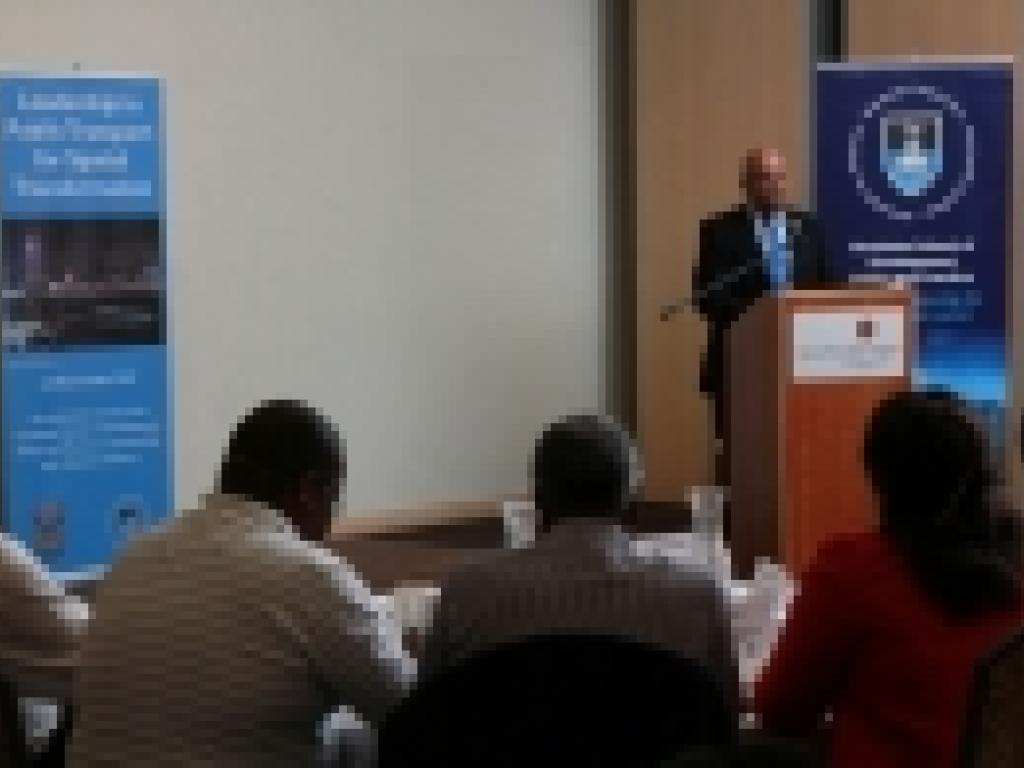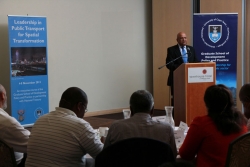Recent Course: Leadership in Public Transport for Spatial Transformation


With thought provoking presentations from Professors Harry Dimitriou, Bartlett Professor of Planning Studies at University College London (UCL), and Romano del Mistro, Emeritus Professor in the Departments of Civil Engineering of the Universities of Pretoria and Cape Town, and full contingents from the 8 Metros and national government it was a very interesting and productive week.
There were many highlights such as the Q&A session with Finance Minister Pravin Gordhan and our very own Amazing Race where participants took all forms of public transport to reach a number of destinations to help inform the policy-making process.
Public transport has emerged as a major focus of urban transformation and metropolitan governance in recent years.
Important drivers have been:
- The Public Transport Strategy of the National Department of Transport which helped create a new vision and impetus for urban public transport reform with a focus on establishing integrated public transport networks as the foundation for future urban development;
- The National Land Transport Act (NLTA) which has changed the institutional landscape in a far-reaching manner with its emphasis on assigning responsibility for the whole urban public transport function to the municipalities;
- The major public transport investments made in recent years including the Gautrain, the Public Transport Infrastructure and Systems Grant (PTISG) focused on integrated rapid public transport networks and in particular BRT implementation and the funding now allocated for commuter rail upgrades.
These changes have generally been welcomed by the metropolitan municipalities and other stakeholders but it is acknowledged that the reform has thrown up major challenges, including strategic, institutional and funding challenges.
National Treasury’s City Support Programme (CSP) is developing a programme to support urban mobility reform. The CSP offers assistance in providing resources to promote an integrated approach to future metropolitan spatial development involving core city, human settlement, mobility and climate change implementation support. The CSP seeks to strengthen existing planning processes, align various national grants and other funding sources, and provide targeted implementation support to strengthen outcomes across the built environment – including in public transport.
The partnership with UCT, DoT, CoGTA, SALGA, and SACN targets the strengthening of metropolitan leadership and management teams as one pillar of support. The course aims to highlight the potential of transport as a transformative tool in cities – transforming both the way cities think about land use and citizen mobility. It seeks to enable metropolitan political and administrative leaders to get to grips with current challenges, learn techniques and tools, and be inspired to lead and implement change in urban mobility and land use management so as to connect, integrate and transform our cities into more inclusive, productive and sustainable cities.
The course
The course took place over 5 days during which city leadership reflected on the issues facing them and began to craft a strategy to transform urban transport in their regions.
City teams came to the course with their urban mobility priorities, plans and indicators and had the opportunity to review their plans to make them more realistic and more effective. The course also enabled city leadership to think through overcoming the obstacles to implementation and creating the team environment across the functional and political-admin divides required to achieve substantial success.
An important purpose of the programme was to enable participants to get to grips with the various challenges and develop robust common leadership approaches for addressing them. In particular, the course focused on how leaders can use their personal agency to drive the mobility agenda in a context of a lack of legislative and institutional clarity. The programme also assisted leaders to manage expectations created as a result of the first phase of BRT roll-out. Specifically, the programme assisted municipalities to improve the quality of their planning, grant submissions and implementation practices.
